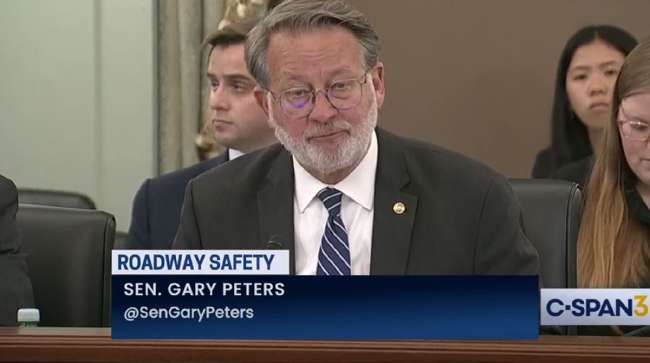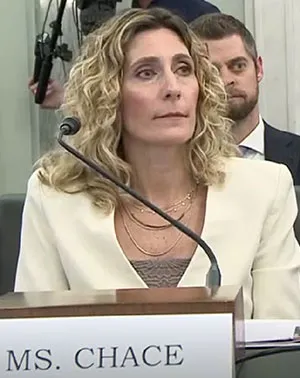Senior Reporter
Senator Promotes Emerging Transportation Technologies

[Stay on top of transportation news: Get TTNews in your inbox.]
The adoption of emerging technologies contributes to safety improvements throughout the nation’s transportation network, federal lawmakers and stakeholders said in a renewed push to reduce highway fatalities.
Sen. Gary Peters (D-Mich.) recently sounded the alarm about ongoing safety concerns across freight and commuter corridors. He was joined by groups supporting Congress’ focus on improving safety programs and technological capabilities for surface transportation systems.
“Every day, unfortunately, more than 100 Americans lose their lives on our roads. If trends continue, we expect more than 40,000 fatalities this year and hundreds of thousands of serious injuries. That means thousands of families are going to be torn apart by preventable crashes,” Peters said during a Surface Transportation, Maritime, Freight and Ports Subcommittee hearing May 21. “Also, over-represented in these tragedies are black, Hispanic and Native Americans, as well as Americans living in rural areas. We need a strong and comprehensive response, and today we will discuss a holistic safe systems approach to addressing the roadway safety crisis and how we can implement that approach all across our country.”
The subcommittee met for an oversight hearing to examine growing concerns over the rate of roadway fatalities. Peters is the subcommittee’s chairman. “I believe emerging technologies are going to play an important role in this endeavor,” the senator went on. “New interventions, from digital infrastructure that improves crash response to predictive road maintenance and active traffic management, are absolutely essential to achieving safe system goals.”
Stakeholders cited National Highway Traffic Safety Administration data estimating that nearly 41,000 traffic fatalities occurred in 2023. “To fully access these benefits and realize a safer, greener and smarter transportation system, federal transportation policy needs to be updated and modernized to include transportation technology at every step of the process, from planning to construction to operations. Technology cannot be a ‘nice-to-have’ and must be holistically incorporated into transportation budgets and operations,” said Laura Chace, president and CEO of the Intelligent Transportation Society of America. “This requires a fundamental shift in our approach to how we plan, fund, and procure infrastructure and technology.”

"Technology cannot be a ‘nice-to-have’ and must be holistically incorporated into transportation budgets and operations,” said Laura Chace. (C-SPAN)
Jeff Farrah, executive director of the Autonomous Vehicle Industry Association, emphasized NHTSA’s data points in pressing Congress to advance legislation associated with the deployment of autonomous vehicles. Policymakers on Capitol Hill continue to debate legislation specific to autonomous vehicles and funding that would increase the budgets at NHTSA and other transportation agencies to help advance AV deployment.
“By building safety-first cultures, [autonomous vehicle] developers further enhance the safety benefits of the vehicles they are designing. The AV industry believes that public trust in AVs goes hand-in-hand with their deployment and that we must earn and maintain that trust,” said Farrah, adding, “Today, human error, including speeding, unfamiliarity with the roadway, and fatigue, is a major contributor to roadway incidents. AVs are designed to remove that error from the equation, as they do not drive distracted or tired.”
A recent survey from the National Safety Council determined growing support exists for local agencies to amplify transportation safety initiatives. “These survey findings provide tremendous insight as we continue to advocate for much-needed change on our roadways,” said Lorraine Martin, the group’s president and CEO who chairs the Road to Zero Coalition.
Led by Transportation Secretary Pete Buttigieg, the Biden administration has committed to reducing traffic fatalities to zero by 2050. Touting the USDOT National Roadway Safety Strategy, the secretary told stakeholders earlier this year: “The whole country rightly takes note when there is so much as a close call in aviation. Imagine if we applied that same seriousness of purpose to the crisis of road safety in America that claims more than 100 lives — which is to say, as many people as fill an airplane — every single day. It’s unacceptable. The reality is unacceptable. And that’s why we’re not treating it as unavoidable.”
Want more news? Listen to today's daily briefing below or go here for more info:



